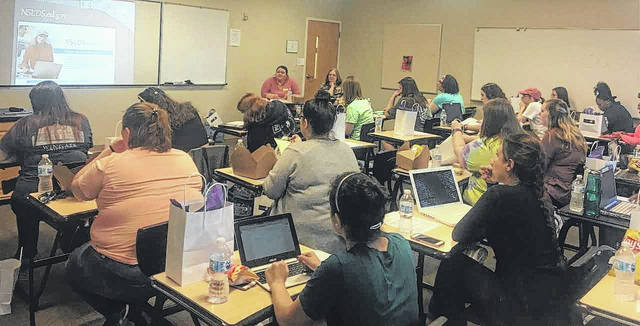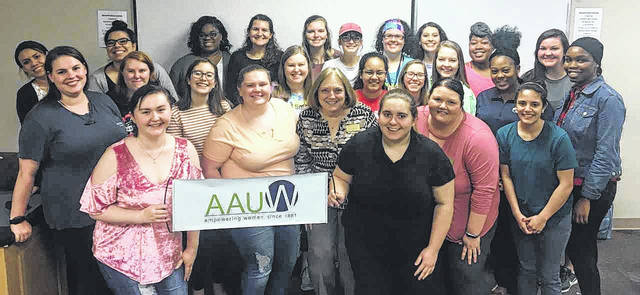As the nation celebrates women’s history this month, a new program at Wingate University is helping female students focus on building a better future. Dubbed “empoWer” and funded by a $2,000 Campus Action Program grant from the American Association of University Women, the workshop series is aimed at improving financial literacy, developing career and leadership skills and encouraging leadership self-efficacy.
Twenty-five female students, mostly seniors, were chosen for the program from more than 50 applicants. After one installment, a Feb. 21 session led by Wingate’s Student Financial Planning office, the series is already effecting change.
“I learned that money truly can be a big source of worry if you allow it,” student Chloe Galloway says. “The information I was able to get allows me to have a better understanding and create a more positive relationship with my money.”
EmpoWer developers and assistant professors Terese Lund and Christi Sporl say they sought the grant to help the University better deliver on its promise to provide students with “transformative experiences that foster prospects and purpose.”
They saw the need for a workshop after the Bulldog Poll, an annual undergraduate student survey, showed that female students were more likely to be worried about life after graduation (getting accepted to graduate school, looking for a job, etc.) and about cost and loans than their male counterparts.
A sociology professor and advisor for the student organization SAGE (Students Advocating for Gender Equality), Sporl wasn’t surprised by the poll results showing anxiety around debt, especially given the number of first-generation college students at Wingate.
The AAUW’s own report, “Deeper in Debt,” shows that women take on larger student loans than men and, because of the gender pay gap, have less disposable income to repay the loans. In fact, women represent 56 percent of those enrolled in American colleges and universities, but they hold nearly two-thirds of the nation’s outstanding student debt – more than $800 billion.
Lund, Women’s and Gender Studies chair in the Department of Psychology, says the first workshop went beyond talk of repaying college loans and was designed to help women take control of all their finances.
“February was Financial Aid Awareness Month, but we wanted to give participants information pertinent to them now and when they get that first job,” Lund says. “We also looked at things such as 401-Ks and credit cards.” She was pleased by the student response.
“We started at 5:30 p.m., and at 7:20 they were still raising their hands, asking questions and excited to learn,” Lund says. The material was developed and presented by Teresa Williams and Jenn Pearson in the Office of Student Financial Aid.
Sporl says one student asked if her mother could attend the next session because she thought the information was so valuable that she wanted her to hear it too.
Breaking down gender barriers
Lund and Sporl expect an equally enthusiastic response to the next empoWer session, Lessons in Leadership, set for Thursday. The workshop will feature personal stories and advice from Wingate University Provost Helen Tate and other female leaders. Discussion will focus on barriers to leadership, leadership skills and advocacy.
Katelyn Gilligan, president of SAGE and one of two students working closely with Lund and Sporl to coordinate the workshops, said she is most looking forward to “learning about leadership strategies for women to progress through their lives.”
“I am excited to be able to learn about ways to break down gender barriers,” she says.
The professors say input from Gilligan and from student Sarah Gilliland has been invaluable as they have tried to isolate students’ needs and plan ways to address them.
“We don’t want it to be just adults telling students what they need,” Lund says. “Students need to be actively engaged and working with faculty on campus. We come at it from a very academic perspective. But it’s different to hear from the students. It is more authentic.”
Sporl says the students on the committee give feedback, share specific questions and help organizers make the best use of the workshops’ limited time.
Gilligan says serving on the Campus Action Program team has been empowering in itself. “Being able to work with two professors who have so much experience in the fields that I am interested in has been an incredible experience,” she says.
In recognition of Equal Pay Day, the final empoWer workshop, set for April 16, will focus on career skills and will be led by the University’s Center for Vocation, Internships and Career Services.
Participants in the Life After Wingate session will learn how to prepare a resume, look for a job in their field, negotiate salary and prepare for graduate school.
“Some evidence suggests that 57 percent of men negotiate salaries, but only 7 percent of women do the same,” Lund says. “We want to give them the skills and confidence to ask for what they are worth.”
They also want to address Bulldog Poll results that show that female undergraduates are less confident about pursuing graduate school than their male counterparts.
Dealing with pay gap
Lund says that, across the nation, more women are getting master’s degrees than men, but they are still making less money.
Although she and Sporl can’t solve the gender pay gap, “there are things we can do with our students on our campus to help them improve their prospects,” Lund says.
Sporl says she’s already proud of the empoWer program.
“Just having the opportunity to strengthen the skills of our female students and help them move forward in their careers, help them feel confident in making sure their voices are heard, that’s significant,” she says.
EmpoWer will wrap up with a closing celebration on April 23, but not before post-workshop surveys are conducted to help Sporl and Lund collect data to help assess the program’s effectiveness.
Galloway has high hopes about empoWer’s results in her own life.
“I am looking forward to gaining skills that will allow me to be a more productive woman in society post-graduation,” she says. “As women, we are already at a disadvantage, and so having this opportunity to meet women who have been successful and are giving other women the chance to do the same is amazing.”


